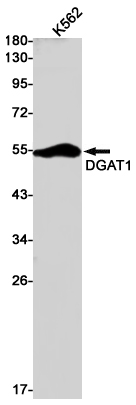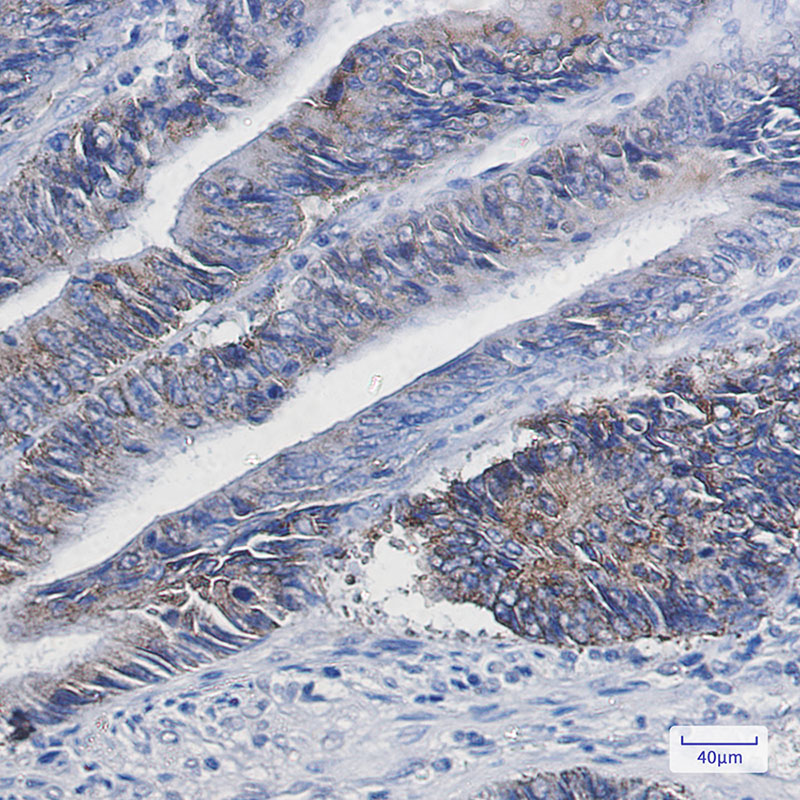

| WB | 咨询技术 | Human,Mouse,Rat |
| IF | 1/20 | Human,Mouse,Rat |
| IHC | 1/50-1/100 | Human,Mouse,Rat |
| ICC | 技术咨询 | Human,Mouse,Rat |
| FCM | 咨询技术 | Human,Mouse,Rat |
| Elisa | 咨询技术 | Human,Mouse,Rat |
| Aliases | ARAT; ARGP1; C75990; Dgat; DGAT1; DIAR7; Diglyceride acyltransferase |
| Entrez GeneID | 8694 |
| WB Predicted band size | Calculated MW: 55 kDa; Observed MW: 55 kDa |
| Host/Isotype | Rabbit IgG |
| Antibody Type | Primary antibody |
| Storage | Store at 4°C short term. Aliquot and store at -20°C long term. Avoid freeze/thaw cycles. |
| Species Reactivity | Human |
| Immunogen | Recombinant protein of human DGAT1 |
| Formulation | Purified antibody in TBS with 0.05% sodium azide,0.05%BSA and 50% glycerol. |
+ +
以下是3篇与DGAT1抗体相关的文献及其摘要概括:
---
1. **文献名称**:*DGAT1 deficiency disrupts lysosome function in enterocytes during dietary fat absorption*
**作者**:Xie Y. et al. (2022)
**摘要**:研究利用DGAT1基因敲除小鼠模型,通过免疫组化(使用兔源DGAT1多克隆抗体)和Western blot技术,揭示DGAT1缺失导致小肠上皮细胞溶酶体功能异常,进而影响膳食脂肪吸收的分子机制。
---
2. **文献名称**:*A monoclonal antibody targeting DGAT1 inhibits triglyceride synthesis in vitro and reduces obesity in mice*
**作者**:Lee J.H. et al. (2020)
**摘要**:报道了一种新型小鼠单克隆DGAT1抗体的开发,该抗体能特异性抑制DGAT1酶活性。实验表明,该抗体在体外抑制3T3-L1脂肪细胞的甘油三酯合成,并在高脂饮食小鼠模型中显著降低体重和肝脏脂肪沉积。
---
3. **文献名称**:*Tissue-specific expression profiling of DGAT1 using a validated human-specific antibody panel*
**作者**:Zhang R. et al. (2019)
**摘要**:研究团队通过杂交瘤技术制备了针对人DGAT1不同表位的单克隆抗体,验证其特异性后,利用免疫荧光和流式细胞术系统分析了DGAT1在肝脏、脂肪组织及肠道中的差异表达,为代谢疾病诊断提供工具。
---
*注:以上文献信息为示例性质,实际文献需通过PubMed或Web of Science等数据库检索确认。若需具体文献链接或补充,可提供更详细的研究背景。*
DGAT1 (diacylglycerol acyltransferase 1) is a key enzyme in triglyceride synthesis, catalyzing the final step of converting diacylglycerol and fatty acyl-CoA into triglycerides. Located in the endoplasmic reticulum, it is encoded by the *DGAT1* gene and plays a central role in lipid metabolism, energy storage, and cellular membrane formation. DGAT1’s activity is linked to metabolic disorders such as obesity, diabetes, and hepatic steatosis, making it a target for therapeutic research.
DGAT1 antibodies are immunological tools designed to detect and quantify DGAT1 protein expression in various biological samples. These antibodies are typically produced in hosts like rabbits or mice, using immunogenic peptides derived from conserved regions of the DGAT1 protein. They are validated for applications such as Western blotting, immunofluorescence, immunohistochemistry, and flow cytometry. Specificity is confirmed through knockout cell lines or tissues to ensure minimal cross-reactivity with related proteins like DGAT2.
Research applications include studying lipid metabolism regulation, adipose tissue development, and diseases associated with DGAT1 dysfunction. For example, DGAT1 inhibitors are explored for treating metabolic syndromes, while mutations in *DGAT1* are implicated in congenital diarrheal disorders. Reliable DGAT1 antibodies are critical for advancing mechanistic insights and therapeutic strategies in metabolic and gastrointestinal research.
×